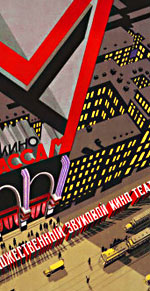
| Jacket 36 — Late 2008 | Jacket 36 Contents page | Jacket Homepage | Search Jacket |
This piece is about 3 printed pages long. It is copyright © Olga Livshin and Jacket magazine 2008. See our [»»] Copyright notice. The Internet address of this page is http://jacketmagazine.com/36/rus-iskrenko-by-livshin.shtml

Back to the Russian poetry Contents list
1
Nina Iskrenko is one of the underground Soviet poets who opened, or rather exploded, several doors for the post-Soviet generation. Her work — both with her own poetry and with the events of Moscow’s Poetry Club, which included over a hundred poets in the late 1980s — helped create a new set of expectations for poetry in Russia.
Paragraph 2
“Official” (or publishable) Soviet poetry took shape within a limited lexicon and offered either a clear ideological program and/or tame lyrical content. Iskrenko, who knew and admired Dmitri Prigov, worked with the Conceptualists to tear apart the predictable form of Soviet poetry, and expanded strikingly on the Conceptualist parody of Soviet discourse. Her work mixes official and quasi-scientific writing styles with slivers of vernacular, occasional obscenity, and visceral descriptions of death, sex, and disease.
3
These experimentations were viewed alternately as innovative and inappropriate by her audience, not least because she was a woman who defied the late Soviet ideal of a subdued, manicured femininity. Iskrenko was the first female poet at the time of Perestroika to write explicitly about sexuality, and with a penchant for the grotesque.
4
Her public readings — one of which played out a mock striptease as a parody of both the Perestroika-era fascination with pornography and Gorbachev’s mythologizing of freedom — challenged the intelligentsia’s expectation that poetry should be read with solemn dignity. Iskrenko also stands out as a figure who actively organized group performances, a rarity among the individualistic Soviet poets who had just come out of the underground.
5
For years, her readers sent her messages stating: “Do you seriously think this is poetry?” Of course, this is poetry, and it is poetry that thrives on diversity, on a lack of singular normativeness. Today, variation of style and the use of multiple voices in one poem, are common features productively mined by many younger authors.
6
In her ode-cum-programmatic statement, “Hymn to Polystylistics,” Iskrenko challenges those who expect uniform style, by creating an eclectic harmony. In this one poem, she alludes to a seminal text on quantum mechanics, the Armenian alphabet, Tolstoy, and various other styles and voices. If this is postmodern pastiche, it is a strangely connective one, one that aims to explode a discourse as well as to heal it.
7
When the Soviet Union was collapsing, Iskrenko made references to Georgia, Armenia and Kazakhstan as part of some larger, inexplicably connected realm, which the persona of the poet attempts to unite, not in the spirit of nationalism, but with the wispy, tacit logic of a lyric poem. Likewise, objects seek to touch or become attached, as though desiring each other:
8
one part of a dress
made of fine silk
is attached
to the other two parts
made of Play-Doh,
9
And this woman’s fine primitivist dress is evidently observed by “country boys.” The marrying of styles, personae and quotations is explained in terms of constant universal change, in which affections are created and dropped: “celestial aerobics / ... the law of cosmic fickleness.” This is art’s celebration of the universe’s seemingly inexplicable connections and disconnections, and art that mirrors the universe through its unstable combinations of dissimilar styles.
10
The intense lyricism of such a celebration (celebrating art, celebrating life) might seem strange in the context of the Soviet Union’s collapse–failed dreams, civil war, and stale economies are usually not the occasion for exultation. However, for Iskrenko the sentiment seems to have taken root not in observable life but in her reactions to her observations.
11
In an essay on the unofficial poet Iskrenko writes:
12
Compassion for our age, acceptance of it as a given, and together with it a keen sense of its incompleteness, desire to change something, and doubt, suggested by actual experience, of our potentialities... these features are indicative of the outlines of the conflict which, in one way or another, appears in the poetics of the 1980s.
13
Iskrenko’s own “compassion for her age” was backed up by a notion of the poet who is equally variable, who speaks in heteroglossia: a “super-poet, as a plenipotentiary representative of the whole race .... a clot of spiritual energy united for all time.”
14
It would not be an exaggeration to say that Nina Iskrenko was a subversive author who effected considerable literary change with her work and encouraged it among the poets of her circle. However, it is better to simply note that her poetry turns the solemn edifice of Soviet culture into a subversive circus, and then reshapes that circus into a mystical cosmos.
Olga Livshin was born in Odessa in 1978 and came to the United States with her family in 1993. Her poetry in English and Russian has been featured in bilingual journals such as Reflect/ Kuaduseshcht. She is a two-time winner of the Robert Fitzgerald Translation Prize, and her translations from Russian appear in Contemporary Russian Poetry: An Anthology (Dalkey Archive Press, 2008) and other publications, and have been staged by Caffeine Theatre in Chicago. She teaches Russian at University of Alaska, Anchorage.